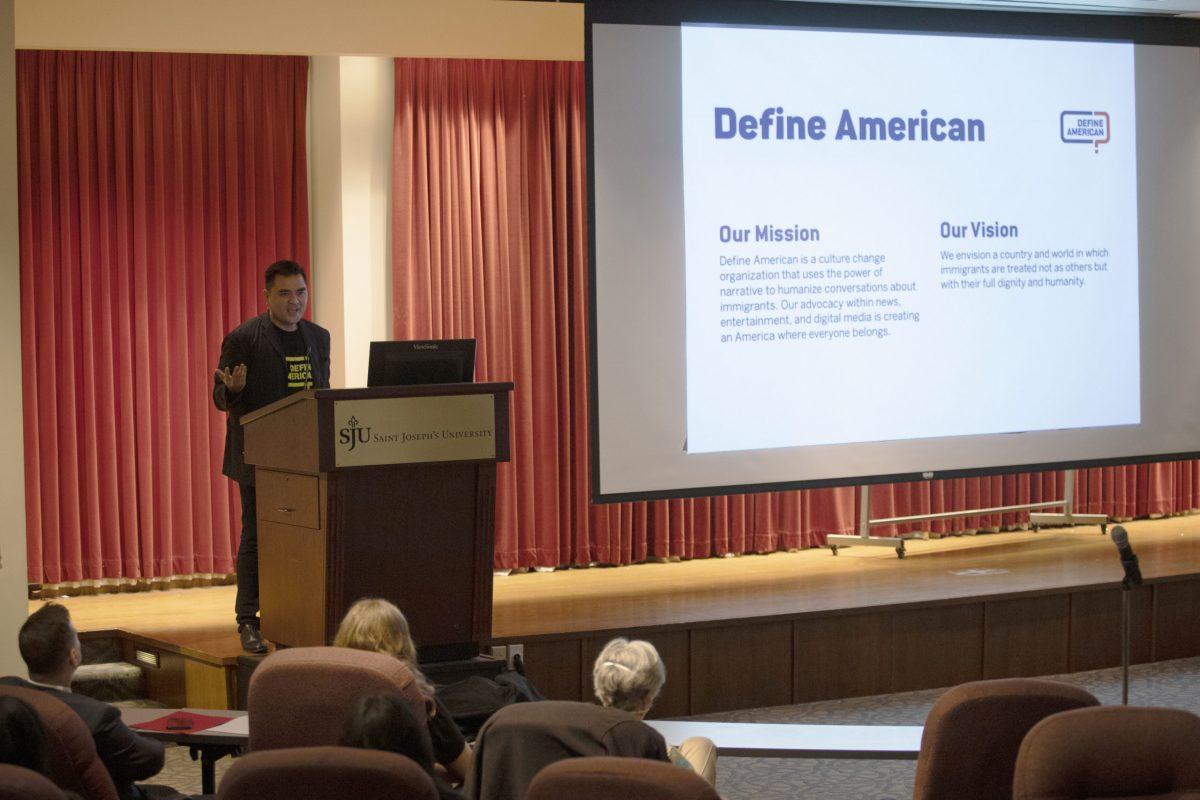Jose Antonio Vargas, a Pulitzer Prize-winning journalist and author of the memoir, “Dear America: Notes of an Undocumented Citizen,” spoke at St. Joe’s on March 31 as part of an SJU Reads event.
SJU Reads is an early arrival program for incoming first-year students, rising sophomores and transfer students. As part of the program, students read a book selected by program coordinators that addresses a contemporary social justice issue in the U.S. Once on campus, students participate in discussions led by faculty and student leaders and in other experiential learning activities.
Vargas, whose book had been the 2019 SJU Reads selection, was originally scheduled to deliver his remarks in March 2020. Several members of the audience were students who read his book in 2019. Vargas said this talk was his first live event in two years and he was happy to be back on the road.
“For more than a decade now, I’ve actually been traveling across the country,” Vargas said during his talk. “Before the pandemic I visited 49 states, every state but Alaska, talking to everybody of all ages, racial backgrounds, Republican and Democrat, from progressive activists to Trump voters. I think it becomes really, really important to engage everybody, even the very people watching me who want me deported from this country.”
In 2018, Nancy Fox, Ph.D., professor of economics, read Vargas’ book and found it so compelling she said it inspired her to restart the SJU Reads program.
“It is an incredibly well written book and a compelling story,” said Fox in response to written questions from The Hawk. “It is personal and universal. And it left me wanting to know more about him. Also, DACA [the Deferred Actions for Childhood Arrivals program] was expiring at that time. I think that his story informs that debate and provides an excellent answer to ‘you came here illegally, get in line and follow the rules.’”
As his memoir recounts, Vargas was smuggled into the U.S. from the Philippines to live with relatives when he was 12 years old. Now 41, he has pursued his career as a journalist, filmmaker and a leading national voice on immigration in the U.S., all while living in the U.S. without legal permission. He also founded the organization, Define American, which has the tagline “Humanizing the immigration narrative, one story at a time.”
During his speech, Vargas told a story about the time he first found out he was not legally living in the country when he tried to apply for a driver’s license and had to confront his grandfather.
“Their plan was to get me here, go to school until high school, and then I was supposed to work at the flea market where my uncles were working under the table,” Vargas said. “And then I’m supposed to find a woman to marry who’s a U.S. citizen, and that’s how we become American. That was their plan, which they didn’t tell me, until all of this exploded.”
That plan exploded in part because Vargas is gay.
“So what do we do?” Vargas said during his talk. “Do we do another lie? They already lied to get me here so now am I supposed to lie to a woman?”
Vargas said one of his “salvations” came in the form of an English teacher who told him he “asked too many annoying questions” and should pursue journalism. She helped send him to a journalism camp when he was in high school.
“I couldn’t believe that my job was to ask questions,” Vargas said during his talk. “I think as long as I was asking people questions, they couldn’t ask me questions, so it was a perfect way to not get found out.”
Richard Gioioso, Ph.D, associate professor of political science and director of international relations, helped revitalize the SJU Reads program as a faculty coordinator. Gioioso said hearing directly from people like Vargas helps give a better understanding of what people living in the U.S. illegally go through.
“I think that we gain a perspective that otherwise exists behind the scenes, behind the curtains, or in the shadows,” Gioioso said. “We, as an audience of a speaker like Jose Antonio Vargas, gain a personal, more intimate understanding of what life is like, not what the politics or the rhetoric is around Dreamers [immigrants benefiting from DACA or the DREAM Act] or undocumented immigrants.”
Hana Haile ’24 attended Vargas’ speech and said she found it inspiring.
“Everything he was saying just hit in the right places and defined who we are as people, not as a generalized group,” Haile said. “When he said the narrative versus the story, I think that’s a pretty large issue in our country, that we just generalize the story for everybody instead of knowing the distinction that a narrative is a system of stories and a story is just one person.”





































